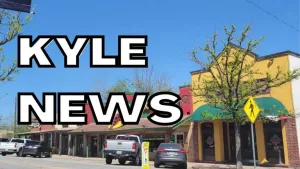By Moses Leos III
The installation of license plate recognition (LPR) technology in three Kyle Police Department vehicles has drawn various concerns from the constituents they serve.
It comes as the department readies to use the LPR technology by March, according to Kyle Police Chief Jeff Barnett. According to Barnett, one of the purposes of installing the technology is to tackle the $4.8 million in outstanding warrants owed to the city.
He added the technology would also flag stolen vehicles and vehicles associated with Amber Alerts, Silver Alerts and missing persons.
In January, the Kyle City Council approved an agreement with Vigilant Solutions, Inc. for use of the LPR technology by a 5-0 vote. Within the agreement, the city received the products at no cost, provided Vigilant receives 25 percent of any warrant collected.
Vigilant will install equipment that scans and collects license plate information. It will allow officers to conduct a traffic stop if the owner of the vehicle has an outstanding Class C misdemeanor warrant.
The information would be transferred to a database that belongs to the department, but is managed by Vigilant.
He said the information collected will not be sold to a third party, and that Vigilant follows the standards of security and “tight protocols” followed by the Texas Crime Information Center (TCIC) system.
But many citizens expressed concern on a Hays Free Press Facebook post on the topic of the LPR technology.
Suzanne Teshera wrote there’s “no reason whatsoever to ‘collect data’ on me and store it in a data base.”
“I agree they need to start collecting those outstanding warrants – just get after it. Without affecting noninvolved citizens,” Teshera wrote.
Various comments also centered on the safety and storage of information gathered by the technology. Andre Lenartowicz wrote credit card reading over a “(most likely) unsecured wireless data network doesn’t seem very wise.”
Ty Reuter asked how much personal information is going to be “available for police OR HACKERS to access at any point in time?”
“You are opening up the possibility of fraud and abuse by trying to make law officers debt collectors,” Vicki Witte Arnold wrote.
According to Barnett, Vigilant will also install credit card readers that allow Kyle Police to take payments for outstanding warrants during traffic stops.
Barnett said the option to pay is “strictly voluntary” and the department isn’t “going to make” residents pay their warrant. Other options include officers escorting the person to municipal court to pay their warrant, or take the person to jail.
“There is nothing anywhere that will require a police officer to make a citizen make the payment,” Barnett said.
Sean Norton wrote on Facebook that he didn’t care for turning law enforcement into “revenue enforcement.” He added warrants by definition fall to the constable’s office, or to bounty hunters.
“These folks are not hired to be court clerks,” Norton wrote.
Other concerns voiced dealt with the additional fees being added by the private company.
Barnett said he didn’t believe the 25 percent fee was too steep. According to city documents, a governing body is allowed by state law to set a fee that is “reasonably related” to the expense incurred up to the “maximum fee percentage.”
He didn’t believe the department should foot the bill for the service.
“It would be punishing taxpayers because that person [with a warrant] owes money to the city,” Barnett said. “I don’t believe cities should give a 25 percent discount because they were eluding the court.”
Several commenters were in favor of the department’s use of LPR technology.
“Sounds good to me, as long as you appear in court and pay your fees and fines no problem,” Ian Vandenberg said. “Only people it will inconvenience will be those trying to avoid responsibilities.”
For Barnett, the technology gives residents an option they didn’t have before.
“The only option without that is to go to jail. They didn’t lose that option,” Barnett said. “Now they get another option to choose from.”










